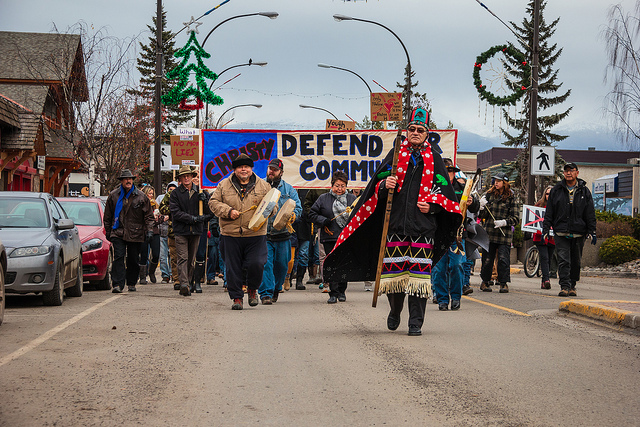Please support our coverage of democratic movements and become a monthly supporter of rabble.ca.
Where I come from, people will spit at you if they think you support Enbridge. That’s because we not only get the pipeline risk, but also the tanker risk, and the inevitable splashes that come with loading diluted bitumen into the tankers, which would mean constant micro-spills. Despite being bombarded with a lot of pretty ads reassuring us that our fears about tanker accidents are unjustified, the world-class tanker-safety system in the Douglas Channel, so far, amounts to one orange plastic triangle nailed to a tree.
My mother is Heiltsuk and my father is Haisla, both small coastal First Nations on the west coast of British Columbia. I live in Kitamaat Village, the main Haisla reserve 11 km from the city of Kitimat, which is the proposed terminus of the pipeline. Kitimat is widely regarded as a blue-collar, pro-industry town.
When a recent plebiscite was held to decide whether or not the municipality should support the Enbridge bid, many pundits expected Kitimat would deliver a ‘yes,’ but instead came back with a resounding ‘meh.’ Initial excitement over the announcement that Enbridge was building a pipeline to Kitimat dampened considerably when people discovered that the number of permanent jobs for locals, in the end, would amount to some dock workers.
Add to that the persistent coffee-house rumours that the Chinese partners were negotiating to bring in their own ‘experts’ under the Temporary Foreign Workers Program to help build the pipeline, and the plebiscite’s rejection of Gateway is less mysterious.
My reserve was not allowed to vote in the plebiscite because we’re not residents of the city of Kitimat. We’re also one of the First Nations bringing Enbridge to court. Our position is complicated by the fact that we’re partners in the current liquefied natural gas (LNG) rush. We’ve leased our reserve on Bish Creek, or Beese, as our traditionals call it, for LNG site development. We’re one of the native groups that would stand to gain the most by supporting Enbridge, and there is low-key support here for the project by food-on-the-table conservatives. But their backing is muted because the opposition to it is overwhelming and vitriolic.
Proponents have argued that you already have tankers plying the Douglas Channel delivering petro product and nothing has happened. But these are baby tankers compared to the monsters that are coming. And if the current tankers have an accident, our first responders will most likely be local volunteer Coast Guards who had to fundraise to get a new speedboat.
My mother’s home, the island community of Bella Bella, the main reserve of the Heiltsuk Nation, is 400 km south of us. The Heiltsuk have absolutely nothing to gain from this project, and everything that they hold near and dear to their hearts to lose. Opponents can mock our love of our home as sentimental, but it won’t change what we feel. The land and the ocean are living, breathing entities that supported us, clothed us, fed us, and nurtured our culture from time immemorial. Our ancestors walked here. We want our grandchildren, our great-grandchildren and their great-grandchildren to walk here.
The Haisla are pragmatists. The Heiltsuk have only engaged in peaceful protests. We are quiet moderates in comparison to other First Nations that oppose the pipeline.
If Enbridge has poked the hornet’s nest of aboriginal unrest, then the federal Conservatives, Stephen Harper’s government, has spent the last few years whacking it like a pinata.
Their Omnibus budget bills gutted everything from our education to our sovereignty and (yes, you are reading this correctly) our right to clean drinking water. Their casual disregard of the staggering levels of violence against Native women in Canada continues to be infuriating. As is their expectation that, if lectured sternly and thoroughly at every opportunity about the economic benefits of the Northern Gateway pipeline, the First Nations of British Columbia would obediently lie back and think of Canada.
We’ve had a bulls-eye on our backs since the Harper Conservatives got their majority and the mood in our base is simmering fury. Every Native politician knows if they co-operate with the Conservatives, they risk being branded as Stephen Harper’s Uncle Tom. Supporting Gateway would be political suicide.
The Harper Conservatives (and to a lesser extent, the B.C. Liberals) have punted their responsibility to address unextinguished aboriginal title and concerns to the First Nations residing along the proposed Enbridge Northern Gateway pipeline route and the coast of British Columbia. The government has done so by distancing itself from the political backlash following the June 17 conditional approval of the project and the resulting flurry of court cases.
If the Northern Gateway Pipeline fails to be built, history will say it was partly because Enbridge failed to lobby the First Nations of British Columbia early or intensely enough. But the Harper government’s role in this debacle will not be forgotten, and, whatever the outcome, its legacy will be an entrenched native antipathy to any Conservative agenda.
Eden Robinson is the award-winning author of the novel Monkey Beach.
This article originally appeared on The Globe and Mail and is reprinted with permission.
Photo: flickr/Leadnow Canada



